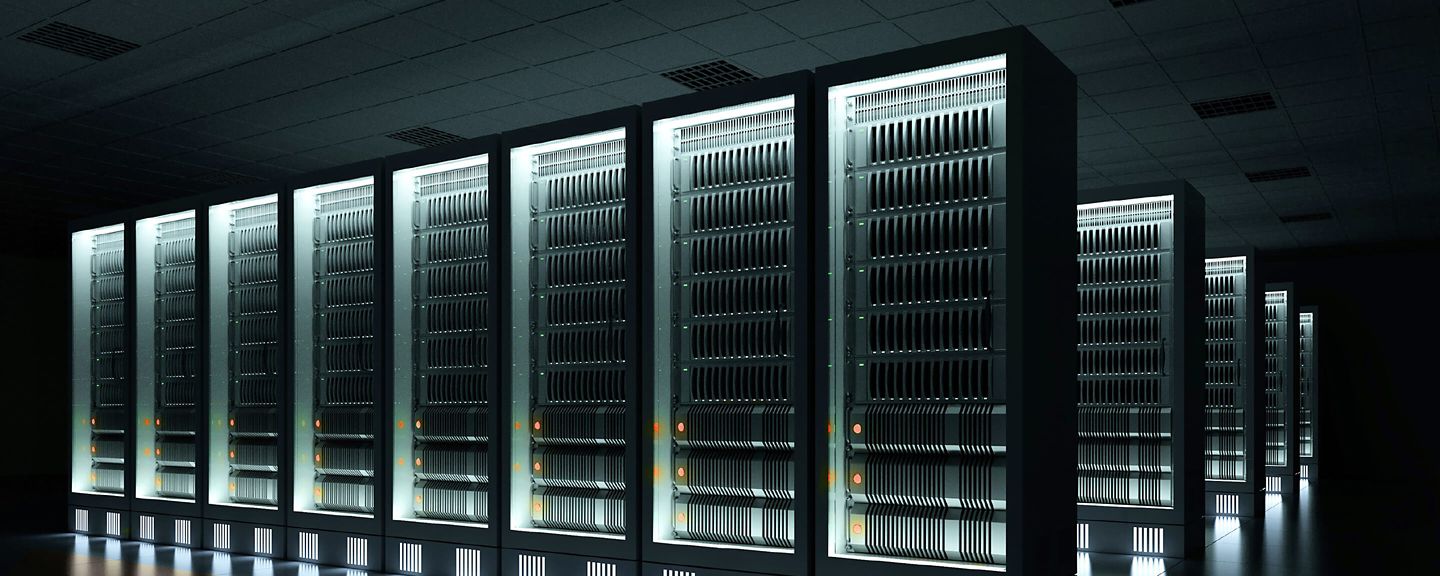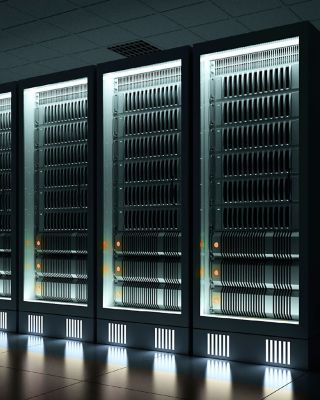Streamline operations, maintain resiliency, cut costs and power productivity. With our building energy management systems (BEMS) and independent partners in 50+ countries, help from Trend is never far away.
Data centre owners have turned to us for decades to help manage risk and protect access to critical data. Combining global support and local expertise, we are a trusted provider for many of the world’s leading data centre operators.
Our Winning Solution For Data Centres
Growth of data centres creates a need for tailored, proven and rapidly deployable offerings to help deliver your objectives. Our comprehensive solutions can make your data centre run more efficiently all the time.
Uptime and business continuity
Our building energy management systems can help predict and resolve issues before they happen. The goal is to deliver robust, resilient systems with built-in redundancy.
Using our supervisor software’s analytic algorithms can warn against decreasing performance and impending failures, enabling you to make fixes before they become problems.
Designed for sustainability
Our innovative solutions can be tailored to suit your individual needs and are supported by backwards-compatible products to protect your investment.
They enable data centre operatives to prioritise and automate activities, helping to optimise performance while supporting sustainability and carbon reduction targets.
Improved deployment efficiency
A modern BEMS offers economy, flexibility and convenience. Our team can deliver systems and scalable solutions with speed for your data centre upgrade, retrofit or new build.
We can also tune your system to ease engineering costs or augment the modular capabilities that can keep your operations running safely, smoothly and in sync.
Digitisation
Move from analogue to digital platforms built for enhanced visibility and control. An integrated BEMS can track real-time data about virtually any built environment.
Use IQVISION software to analyse and present data, automate maintenance and drive more reliable service. With actionable intelligence, you gain a boost to accelerate digital transformation.
What does uptime and business continuity mean for your data centre?
For data centres, uptime and business continuity are huge concerns. The most effective solutions can vary widely depending on your specific needs. There are also general strategies to consider for each size of data centre.
These data centres are usually smaller facilities closer to end users, such as in remote locations or on the network edge.
Uptime is important, but the best strategy may focus on supplying fast, reliable connectivity and having backup systems available in case of disruption.
Micro data centres are compact enough to fit in a small room or office space, but they can process data locally without needing to communicate with the cloud or centralised servers.
Companies are increasingly using micro data centres to meet demand for low-latency service at the edge.
With this in mind, we offer solutions that are quick to deploy and easy to integrate so you can keep computing power closer to users.
Mid-sized data centres rely on uptime for uninterrupted operations and customer satisfaction. That’s why having a tailored solution for business continuity is key.
Your data centre may need redundant cooling systems, for example, or standby generators that can start up automatically during power outage. Regular maintenance and testing can also help prevent downtime.
True to the name, hyperscale data centres are massive, housing thousands of servers and storage systems. They host critical applications, databases and cloud computing services for millions of users worldwide.
Any disruption in service could lead to financial losses, reputation damage and legal liabilities. A good thing, then, that an integrated BEMS can warn against decreasing performance and potential faults.
This gives you time to make informed decisions before your data centre goes dark.
What does being designed for sustainability mean for your data centre?
Data centres face regulatory pressure to soften their environmental impact. The pressure has fuelled demand for solutions supporting energy-efficient operations.
Smart building management is an automated solution for optimising energy use and system performance while supporting carbon reduction targets.
In edge data centres, sustainable design may feature adaptive climate control, which offers multiple paths for potential energy savings. Strategies may involve liquid cooling technology or AC systems that can be programmed to turn on/off under certain conditions.
There are also techniques like cold aisle containment, in addition to renewable energy sources like solar panels with battery storage. Microgrids have emerged as another promising way to provide continuous power.
Being designed for sustainability in a micro data centre may involve the use of virtualisation software to track and limit electricity demand. Pairing software with high-efficiency power supplies and IT hardware can help prevent energy waste.
IQ supervisor software can put energy management on cruise control, tracking real-time data and warning against system inefficiencies. In turn, you can focus on the areas that can improve site-wide efficiency.
A range of technology can support sustainability in mid-sized data centres. For instance, liquid cooling is valuable in reducing energy use by maintaining the optimal temperature of processors and equipment.
Solutions may include dynamic power allocation or prioritised controller functionality, allowing you to prioritise critical equipment so that servers only use the energy they need.
Hyperscale data centres need tailored solutions to address their unique sustainability challenges. Most often, specific designs are required to boost energy efficiency.
Solutions can range from hot/cold aisle containment to manage airflow to using data analytics to enhance server utilisation.
Where possible, our partners use local resources to provide ongoing support, skipping the need for unnecessary travel or site visits.
To further protect your investment, we support our products with a long service life, extended warranty and ongoing development.
What does improved deployment efficiency mean for your data centre?
Deploying solutions quickly and easily is crucial to secure your data centre investment. From design to support, we can help save time on install and maintenance using control systems built for speed.
The growth of edge computing is being driven by 5G and decentralised networks, along with increasing volumes of data, digitisation and growing demand for low-latency applications.
To speed up deployment at the edge, our systems are modular and agile by design, helping you achieve more consistent operational standards with minimum engineering effort.
Micro data centres can benefit from solutions that are customisable and rapidly deployable. One such solution is to converge computing, storage and networking resources into a single system.
Prefabricated systems usually feature pre-integrated IT equipment, power, cooling and management systems to help slash deployment time.
Our systems offer the same flexibility, using open protocols and compatible products engineered specifically for smaller, distributed data centres.
To improve deployment efficiency, mid-sized data centres are increasingly using automation and remote building management tools. These tools can provide real-time visibility and proactive fault resolution, reducing the need for on-site maintenance.
Our solutions are designed to monitor and resolve potential faults from one UI, as well as automate on-site schedules, adjust temperature setpoints and more – with the option to do so locally or remotely.
For hyperscale data centres, valuable information may be needed from specialist subcontractors early in the design process. Procurement routes could be riddled with roadblocks.
However, early engagement using a standardised approach can improve deployment efficiency and reduce overall project risk. We can consult and confirm BEMS designs from early stages of a project.
Repeatable designs could consist of naming conventions, graphics templates, software strategies and alarm configurations.
In later stages, we may look to standardise data logging, energy dashboards, analytics and other processes. Standardisation at each stage can reduce total risk and time of deployment.
What does digitisation mean for your data centre?
Digitisation empowers owners, operators and facility managers to transform their data centre’s operational efficiency.
Through the digitisation of manual processes, organisations can decrease the risk of human errors and help IT staff provision resources quickly.
By employing automation technology and digitisation tools, you, too, can make your data centre more responsive to evolving needs.
Edge computing brings fast processing and low latency closer to their sources. Accordingly, edge data centres are turning to innovative solutions like software-defined networking.
Instead of relying on physical hardware to manage IT infrastructure, a software-defined data centre employs virtualisation to manage network resources.
Similarly, our platforms can provide a virtualised view of system performance with 24/7 diagnostics and early fault detection.
Modern solutions for micro data centres tend to use remote monitoring and energy management tools. These tools use targeted maintenance to improve engineering resource efficiency.
Automation is setting an even bigger presence in mid-sized data centres. Successful IT automation starts with standardised processes that define inputs, outputs and data formats.
Likewise, your data centre may benefit from analytics and machine learning algorithms. A BEMS can observe the energy use of individual components and report the performance of complete systems.
The holistic view of metrics can reveal ways to enhance power usage effectiveness (PUE), carbon usage effectiveness (CUE) and water usage effectiveness (WUE).
Digitation can enable hyperscale data centres to scale with demand. During the commissioning phase, for example, you can use analytics software to improve efficiency by
- Identifying areas that require finetuning
- Providing insight into performance and optimisation
- Indicating overlooked issues or repeat alarms
- Confirming the status of individual items or complete systems
Even better, our open API supports third-party applications, and our digital tools require no special programming skills.
Watch now | How a Trend BEMS can help manage energy and performance



